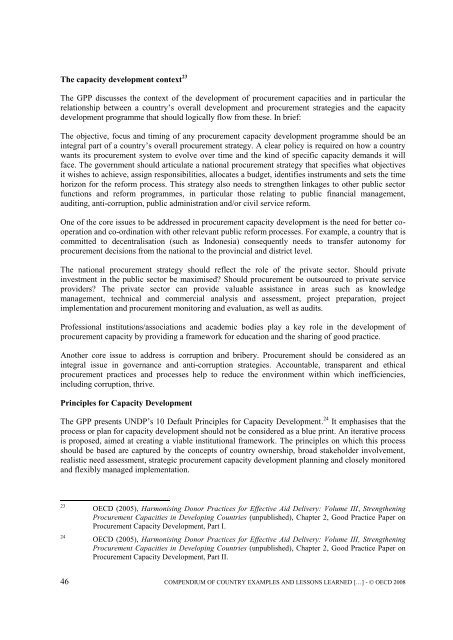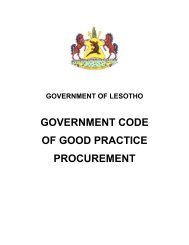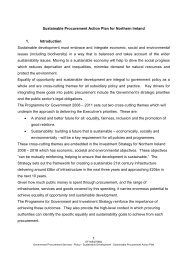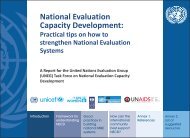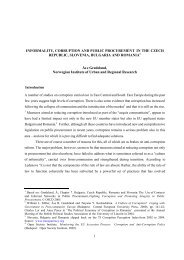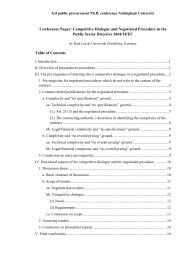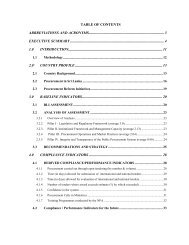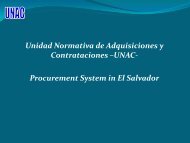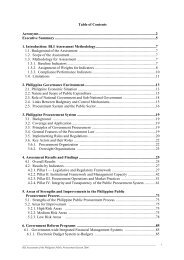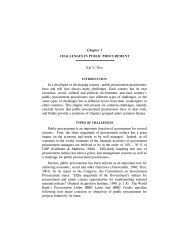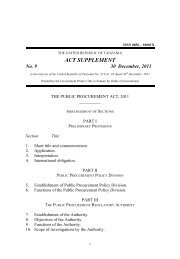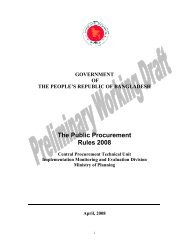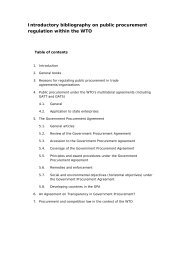Compendium of Country Examples and Lessons Learned from ...
Compendium of Country Examples and Lessons Learned from ...
Compendium of Country Examples and Lessons Learned from ...
Create successful ePaper yourself
Turn your PDF publications into a flip-book with our unique Google optimized e-Paper software.
The capacity development context 23The GPP discusses the context <strong>of</strong> the development <strong>of</strong> procurement capacities <strong>and</strong> in particular therelationship between a country‟s overall development <strong>and</strong> procurement strategies <strong>and</strong> the capacitydevelopment programme that should logically flow <strong>from</strong> these. In brief:The objective, focus <strong>and</strong> timing <strong>of</strong> any procurement capacity development programme should be anintegral part <strong>of</strong> a country‟s overall procurement strategy. A clear policy is required on how a countrywants its procurement system to evolve over time <strong>and</strong> the kind <strong>of</strong> specific capacity dem<strong>and</strong>s it willface. The government should articulate a national procurement strategy that specifies what objectivesit wishes to achieve, assign responsibilities, allocates a budget, identifies instruments <strong>and</strong> sets the timehorizon for the reform process. This strategy also needs to strengthen linkages to other public sectorfunctions <strong>and</strong> reform programmes, in particular those relating to public financial management,auditing, anti-corruption, public administration <strong>and</strong>/or civil service reform.One <strong>of</strong> the core issues to be addressed in procurement capacity development is the need for better cooperation<strong>and</strong> co-ordination with other relevant public reform processes. For example, a country that iscommitted to decentralisation (such as Indonesia) consequently needs to transfer autonomy forprocurement decisions <strong>from</strong> the national to the provincial <strong>and</strong> district level.The national procurement strategy should reflect the role <strong>of</strong> the private sector. Should privateinvestment in the public sector be maximised? Should procurement be outsourced to private serviceproviders? The private sector can provide valuable assistance in areas such as knowledgemanagement, technical <strong>and</strong> commercial analysis <strong>and</strong> assessment, project preparation, projectimplementation <strong>and</strong> procurement monitoring <strong>and</strong> evaluation, as well as audits.Pr<strong>of</strong>essional institutions/associations <strong>and</strong> academic bodies play a key role in the development <strong>of</strong>procurement capacity by providing a framework for education <strong>and</strong> the sharing <strong>of</strong> good practice.Another core issue to address is corruption <strong>and</strong> bribery. Procurement should be considered as anintegral issue in governance <strong>and</strong> anti-corruption strategies. Accountable, transparent <strong>and</strong> ethicalprocurement practices <strong>and</strong> processes help to reduce the environment within which inefficiencies,including corruption, thrive.Principles for Capacity DevelopmentThe GPP presents UNDP‟s 10 Default Principles for Capacity Development. 24 It emphasises that theprocess or plan for capacity development should not be considered as a blue print. An iterative processis proposed, aimed at creating a viable institutional framework. The principles on which this processshould be based are captured by the concepts <strong>of</strong> country ownership, broad stakeholder involvement,realistic need assessment, strategic procurement capacity development planning <strong>and</strong> closely monitored<strong>and</strong> flexibly managed implementation.2324OECD (2005), Harmonising Donor Practices for Effective Aid Delivery: Volume III, StrengtheningProcurement Capacities in Developing Countries (unpublished), Chapter 2, Good Practice Paper onProcurement Capacity Development, Part I.OECD (2005), Harmonising Donor Practices for Effective Aid Delivery: Volume III, StrengtheningProcurement Capacities in Developing Countries (unpublished), Chapter 2, Good Practice Paper onProcurement Capacity Development, Part II.46 COMPENDIUM OF COUNTRY EXAMPLES AND LESSONS LEARNED […] - OECD 2008


